Christmas music
John Henry Crosby | Dec 20, 2011 | 9 cmts
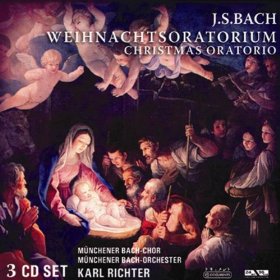 I have been asked to offer some thoughts on Christmas music, while not failing to bring in the distinctive perspective of personalism. This is a joyful task for me, since there is hardly anything I love more than to speak about music, which has accompanied me through life, giving me both expressible nourishment and solace. Truly, one can speak of the "consolation of music."
I have been asked to offer some thoughts on Christmas music, while not failing to bring in the distinctive perspective of personalism. This is a joyful task for me, since there is hardly anything I love more than to speak about music, which has accompanied me through life, giving me both expressible nourishment and solace. Truly, one can speak of the "consolation of music."
The relation between composer & performer
I imagine that for many readers, this post would have greatest value if any of the recommendations I make can still be acquired before Christmas, or at least during the season of the Christmas. This will stretch me, since many particularly precious works, and performances committed to recording, are not as available as they ought to be. If I seem too much the connoisseur, by insisting in the value of certain interpretations, when many other recordings exist, then let me defend myself by pointing out that it is deeply in the spirit of personalism to care not just about the creative work of the composer, but also to recognize the essential contribution of the performer, whose interpretation in fact reflects a mysterious interpersonal communication between composer and performer. It is astounding to realize that what Bach, Mozart, Beethoven, Brahms had to say is so vital that their "words" provide an inexhaustible basis for conversation with the generations of musicians who have expressed their homage through the interpretation which is performance.
Let me say a few words about Christmas music, while mentioning a number of performances that can breathe new life into one's contemplation of the mystery we celebrate these days.
Christmas carols
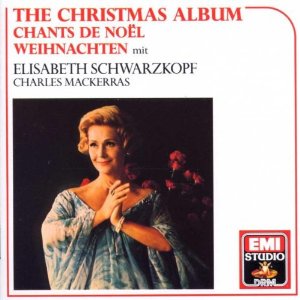 Of course, the Christmas music that most readily comes to mind is the carol. Those lucky enough to have encountered carols in all their richness, know how beautiful and moving they can be. Carols have an ancient lineage within the West, going back to early Roman hymns, while the music we associate with traditional carols go back to medieval Europe, especially to England, Germany, France, and Italy. Sadly, carols have been debased in the minds of many, who find it difficult to break the association with the trivial, commercialized "Holiday music" one has endure in stores and public places already the day after Thanksgiving.
Of course, the Christmas music that most readily comes to mind is the carol. Those lucky enough to have encountered carols in all their richness, know how beautiful and moving they can be. Carols have an ancient lineage within the West, going back to early Roman hymns, while the music we associate with traditional carols go back to medieval Europe, especially to England, Germany, France, and Italy. Sadly, carols have been debased in the minds of many, who find it difficult to break the association with the trivial, commercialized "Holiday music" one has endure in stores and public places already the day after Thanksgiving.
But carols are a genre both musically rich and also deeply pertinent to those committed to personalism as more than a theory of persons but also a vision for living. This has to do with the fact that carols, as songs meant to be sung in homes and in door-to-door caroling, are marked by a particular intimacynot always associated with religious hymns. Perhaps this is because many carols, sung as they are to the infant Lord, have the feel of a lullaby. One finds this, for example, in the ever-moving "Silent Night," composed by the Austrian organist Franz Gruber. There are innumerable recordings of "Silent Night," yet for a particularly moving interpretation in the original German, which preserves the unique Austrian folk idiom, I would recommend the Christmas album of the great soprano, Elisabeth Schwarzkopf.
Bach's Christmas Oratio
When we think of the great composers, of Bach, Mozart, Beethoven, Schubert, Bruckner, we find varying degrees of specifically Christmas music. Bach gave us one of the great works for the feast, namely his Christmas Oratorio, which I find myself turning to every year. There is in Bach a capacity for giving expression to a spirit of ecstatic worship one finds in few other composers. The opening choral, "Jauchzet, frohlocket," embodies this ecstatic joy in all of its purity and radiance. For a still defining rendition of "Jauchzet, frohlocket," listen to this performance on YouTube led by the great Bach conductor, Karl Richter. (The recording is also available on Amazon)
Handel's Messiah
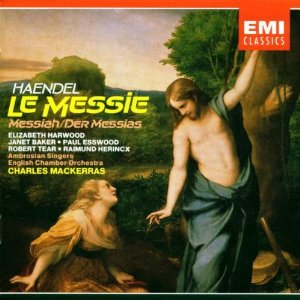 Surely the musical work most associated with Christmas is the Messiah of Georg Friedrich Handel. Divided into three parts, the first of the Messiah, in one memorable chorus and solo after another, recounts the story of the birth of Christ. I have a special love for the Messiah in a German rendition, conducted by Karl Richter, but one of the very great renditions in English is the recording conducted by Sir Charles Mackerras from the 1960s.
Surely the musical work most associated with Christmas is the Messiah of Georg Friedrich Handel. Divided into three parts, the first of the Messiah, in one memorable chorus and solo after another, recounts the story of the birth of Christ. I have a special love for the Messiah in a German rendition, conducted by Karl Richter, but one of the very great renditions in English is the recording conducted by Sir Charles Mackerras from the 1960s.
Schubert's Mass in E flat major
In the quest for "Christmas music," one should not overlook the countless masses written by the great composers. Mozart alone composed almost twenty masses, Schubert six, and Beethoven two. In these masses, one finds varying degrees of musical reflection on the central reality of Christmas, namely the revelation of God in Christ Jesus. This is not just because the Incarnation pervades the liturgy in all its parts, but because the mass when set to music always includes the Credo, and specifically, the lines, "Et incarnatus est."
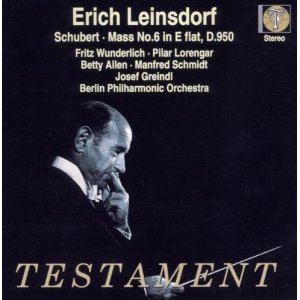 In the hands of the great composers, one can see how theologically rich music can be, since they can, through melodic and thematic repetition, draw out the inner connection between the mass parts and, indeed, between the mysteries of faith. To offer one particularly striking example with direct relevance to Christmas, let me encourage a close listening to Franz Schubert's late (and final) Mass in E flat major. The mass is unusual in many respects, above all the fact that musically one sees the emergence of a new voice in Schubert, a voice of seriousness, strength, and even a new element of the numinous and other-worldly. I hear in this mass an anticipation of the music of Anton Bruckner, yet also the elemental power of Beethoven, who Schubert so revered.
In the hands of the great composers, one can see how theologically rich music can be, since they can, through melodic and thematic repetition, draw out the inner connection between the mass parts and, indeed, between the mysteries of faith. To offer one particularly striking example with direct relevance to Christmas, let me encourage a close listening to Franz Schubert's late (and final) Mass in E flat major. The mass is unusual in many respects, above all the fact that musically one sees the emergence of a new voice in Schubert, a voice of seriousness, strength, and even a new element of the numinous and other-worldly. I hear in this mass an anticipation of the music of Anton Bruckner, yet also the elemental power of Beethoven, who Schubert so revered.
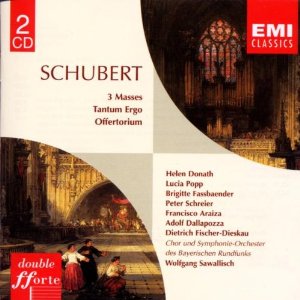 The mass calls for an unusual selection of solo voices: soprano, bass, and two tenor solos (replacing the usual alto for the second tenor). When, in the Credo, we come to the "Et incarnatus est," Schubert scores this, initially, as a duet between the two tenors. The music is solemn and full of pathos—longing for the savior?—undoubtedly a towering passage. Then comes the "Crucifixus," which has something almost jarring about it. Here we encounter what, to my mind, is a unique way of giving musical expression to an important theological reality. Following the "Crucifixus," Schubert does not move directly on to the "Resurrexit," as would typically be the case; rather, he repeats the "Et incarnatus est." One cannot hear the reprise of this heart-melting music without understanding immediately that the arrival of God among men was to conquer sin.
The mass calls for an unusual selection of solo voices: soprano, bass, and two tenor solos (replacing the usual alto for the second tenor). When, in the Credo, we come to the "Et incarnatus est," Schubert scores this, initially, as a duet between the two tenors. The music is solemn and full of pathos—longing for the savior?—undoubtedly a towering passage. Then comes the "Crucifixus," which has something almost jarring about it. Here we encounter what, to my mind, is a unique way of giving musical expression to an important theological reality. Following the "Crucifixus," Schubert does not move directly on to the "Resurrexit," as would typically be the case; rather, he repeats the "Et incarnatus est." One cannot hear the reprise of this heart-melting music without understanding immediately that the arrival of God among men was to conquer sin.
A tremendous interpretation of this mass features the iconic German tenor, Fritz Wunderlich, singing the part of the first tenor. A more recent interpretation, with better sound quality, and another glorious group of singers, features the German tenor Peter Schreier together with baritone Dietrich Fischer-Dieskau.
Lauridsen's "O Magnum Mysterium"
In conclusion, let me draw attention to one exquisite contemporary work of Christmas music, the "O Magnum Mysterium," by the still-living American composer, Morten Lauridsen. Taken from Matins for Christmas, Lauridsen's a cappella setting has been immensely popular, even while those who look for signs of hope in contemporary composition perhaps underestimate the accomplishment of a Lauridsen. An atmospheric performance from Westminster Cathedral can be found on YouTube:
Still awaiting a personalist aesthetics
Turning back to the question of personalism and music, let me conclude by saying that, while we readily acknowledge the contributions of the most various philosophical schools to aesthetics (including phenomenology), one cannot say the same for personalism and aesthetics. It seems to me that personalists who look to von Hildebrand, Wojtyla, Newman recognize the fact that beauty is of the greatest significance for a full vision of personal flourishing, yet that we are still awaiting the day that someone will present a truly "personalist aesthetics." What is more, it seems to me that this work of gaining new ground for personalism is not only necessary but potentially immensely fruitful. After all, beauty awakens love, and love in turn is of primordial concern to personalism.
I fully suspect that a personalist approach to aesthetics would also be refreshing and even surprising, because it would be able to bear in fruitful tension the demands of form, while recognizing that genuine artistic expression is always individual, particular, even idiosyncratic. We personalists, therefore, have work to do...but only after Christmas, and only after first immersing ourselves in some of the treasures of Christmas music which, by lifting up our hearts, draw us into contemplation of the mystery of the Newborn Savior.

Comments (9)
Josie
Dec 21, 2011 5:51am
Wonderful, John! Here’s a link that may interest you:
It’s a video of a thought provoking symposium entitled “Music and Phenomenology” that was sponsored earlier this year by the Simon Silverman Phenomenology Center- a real gem of a place!- at my alma mater, Duquesne University. The video is only 1.5 hours of the entire conference and well worth the time investment if you're interested in the relationship between music, 'being', and language. Blessings!
Jules van Schaijik
Dec 21, 2011 7:16am
Josie, Dec. 21 at 5:51am
Wonderful, John! Here’s a link that may interest you:
Josie, I fixed the link and then clicked it. It leads to a page for installing Microsoft Silverlight. Is that right?
Josie
Dec 21, 2011 8:11am
Jules,
Hmmm...it is linked via Microsoft Silverlight but when I clicked on the link, it automatically loaded the conference. I suppose if one does not have MS Silverlight, it may ask to install. When you did that were you eventually connected to the conference? One used to be able to access the conference video from Duquesne's website but that no longer appears to be the case. At least not from my computer...which is at times tempermental! Here's that link just in case only my computer is choosing to be non-cooperative! http://www.duq.edu/phenomenology/ Hopefully one of these options will work.
Jules van Schaijik
Dec 21, 2011 11:45pm
Sorry not to respond sooner. I've been on the road all day. Still not able to get to the symposium. Oh well.
Jules van Schaijik
Dec 23, 2011 9:15am
I'm looking forward to more of your thoughts on the way in which the composer and the performer cooperate in creating the work of art. It is an interesting factor that distinguishes art forms like music and theater from others like painting and sculpture.
I recently heard or read somewhere that a truly great opera is one that cannot be performed because it is too rich to be captured in a single performance. It reminded me of the idea that human nature is too rich to be captured by one person, or one couple. And the same for sanctity, where each saint offers a new and unique interpretation of the immitation of Christ.
Samantha
Dec 24, 2011 3:14am
Well done, John Henry! I have much more to learn about classical Christian music; there isn't a better time to begin than now! Thank you for this deep reflection on the joyous celebration that soon will begin.
Katie van Schaijik
Dec 24, 2011 8:49am
We listened to the Elizabeth Schwartzkopf album last night. Beautiful. Just the right combination of solemnity and joy.
Mike Wallacavage
Dec 28, 2011 11:22pm
Thanks for your insights on Christmas music, a personal interest of mine. Bach's Oratorio continues to be one of my favorites. I recall the first time I heard it watching Sir Kenneth Clark's series on Civilization. He had "Jauchzet Frohlocket" blended with imagery of that masterpiece of German Baroque, Vierzehnheiligen. Pope Benedict XVI notes "the first Christmas hymn in history, which established for all time the inner melody of Christmas, was not composed by men. St. Luke transmits it to us as the song of the angels who were the "evangelists" of Christmas night" "Glory to God in the highest, and on earth peace among men"-the men who enjoy his favor, the men of good will." May this Peace which only the Christ child can offer be with us all! I also recommend the BBC series on "Sacred Music: a Christmas History" with performaces by the Sixteen!
Katie van Schaijik
Dec 30, 2011 9:45am
Mike Wallacavage, Dec. 28 at 11:22pm
Pope Benedict XVI notes "the first Christmas hymn in history, which established for all time the inner melody of Christmas, was not composed by men.
This is an insight I had never heard before, and yet, as soon as I do hear it, I feel its obvious truth. It goes a long way toward explaining the exceptional beauty and richness and enduring power of Christmas hymnody, doesn't it?
Mike Wallacavage, Dec. 28 at 11:22pm
Thanks for your insights on Christmas music, a personal interest of mine.
I've been listening to lots of your links on facebook, Mike, and loving them. Thank you!